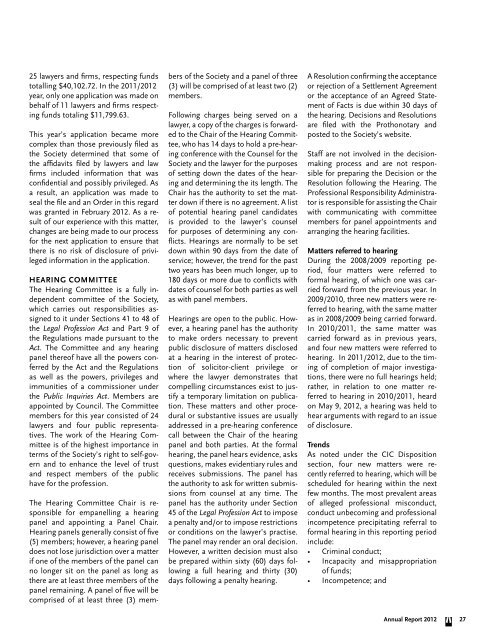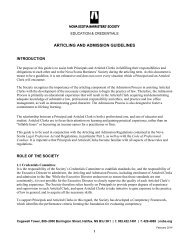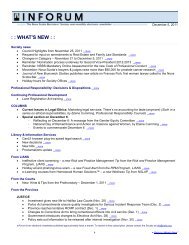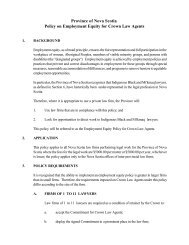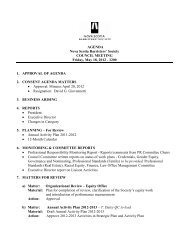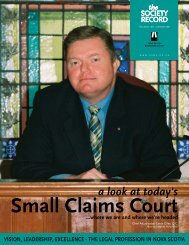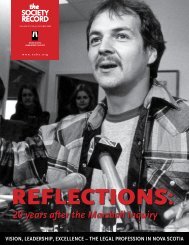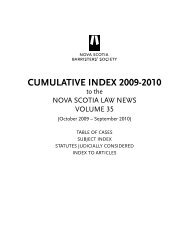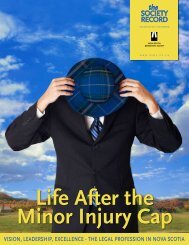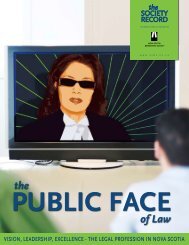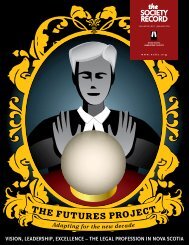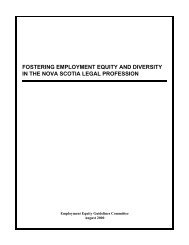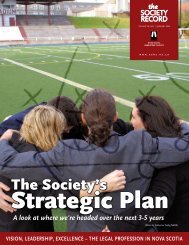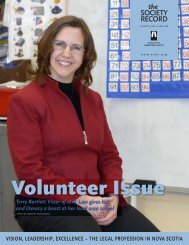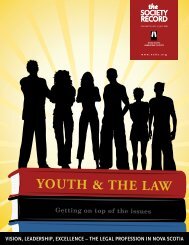2012 NSBS Annual Report - Nova Scotia Barristers' Society
2012 NSBS Annual Report - Nova Scotia Barristers' Society
2012 NSBS Annual Report - Nova Scotia Barristers' Society
Create successful ePaper yourself
Turn your PDF publications into a flip-book with our unique Google optimized e-Paper software.
25 lawyers and firms, respecting funds<br />
totalling $40,102.72. In the 2011/<strong>2012</strong><br />
year, only one application was made on<br />
behalf of 11 lawyers and firms respecting<br />
funds totaling $11,799.63.<br />
This year’s application became more<br />
complex than those previously filed as<br />
the <strong>Society</strong> determined that some of<br />
the affidavits filed by lawyers and law<br />
firms included information that was<br />
confidential and possibly privileged. As<br />
a result, an application was made to<br />
seal the file and an Order in this regard<br />
was granted in February <strong>2012</strong>. As a result<br />
of our experience with this matter,<br />
changes are being made to our process<br />
for the next application to ensure that<br />
there is no risk of disclosure of privileged<br />
information in the application.<br />
HEARING COMMITTEE<br />
The Hearing Committee is a fully independent<br />
committee of the <strong>Society</strong>,<br />
which carries out responsibilities assigned<br />
to it under Sections 41 to 48 of<br />
the Legal Profession Act and Part 9 of<br />
the Regulations made pursuant to the<br />
Act. The Committee and any hearing<br />
panel thereof have all the powers conferred<br />
by the Act and the Regulations<br />
as well as the powers, privileges and<br />
immunities of a commissioner under<br />
the Public Inquiries Act. Members are<br />
appointed by Council. The Committee<br />
members for this year consisted of 24<br />
lawyers and four public representatives.<br />
The work of the Hearing Committee<br />
is of the highest importance in<br />
terms of the <strong>Society</strong>’s right to self-govern<br />
and to enhance the level of trust<br />
and respect members of the public<br />
have for the profession.<br />
The Hearing Committee Chair is responsible<br />
for empanelling a hearing<br />
panel and appointing a Panel Chair.<br />
Hearing panels generally consist of five<br />
(5) members; however, a hearing panel<br />
does not lose jurisdiction over a matter<br />
if one of the members of the panel can<br />
no longer sit on the panel as long as<br />
there are at least three members of the<br />
panel remaining. A panel of five will be<br />
comprised of at least three (3) members<br />
of the <strong>Society</strong> and a panel of three<br />
(3) will be comprised of at least two (2)<br />
members.<br />
Following charges being served on a<br />
lawyer, a copy of the charges is forwarded<br />
to the Chair of the Hearing Committee,<br />
who has 14 days to hold a pre-hearing<br />
conference with the Counsel for the<br />
<strong>Society</strong> and the lawyer for the purposes<br />
of setting down the dates of the hearing<br />
and determining the its length. The<br />
Chair has the authority to set the matter<br />
down if there is no agreement. A list<br />
of potential hearing panel candidates<br />
is provided to the lawyer’s counsel<br />
for purposes of determining any conflicts.<br />
Hearings are normally to be set<br />
down within 90 days from the date of<br />
service; however, the trend for the past<br />
two years has been much longer, up to<br />
180 days or more due to conflicts with<br />
dates of counsel for both parties as well<br />
as with panel members.<br />
Hearings are open to the public. However,<br />
a hearing panel has the authority<br />
to make orders necessary to prevent<br />
public disclosure of matters disclosed<br />
at a hearing in the interest of protection<br />
of solicitor-client privilege or<br />
where the lawyer demonstrates that<br />
compelling circumstances exist to justify<br />
a temporary limitation on publication.<br />
These matters and other procedural<br />
or substantive issues are usually<br />
addressed in a pre-hearing conference<br />
call between the Chair of the hearing<br />
panel and both parties. At the formal<br />
hearing, the panel hears evidence, asks<br />
questions, makes evidentiary rules and<br />
receives submissions. The panel has<br />
the authority to ask for written submissions<br />
from counsel at any time. The<br />
panel has the authority under Section<br />
45 of the Legal Profession Act to impose<br />
a penalty and/or to impose restrictions<br />
or conditions on the lawyer’s practise.<br />
The panel may render an oral decision.<br />
However, a written decision must also<br />
be prepared within sixty (60) days following<br />
a full hearing and thirty (30)<br />
days following a penalty hearing.<br />
A Resolution confirming the acceptance<br />
or rejection of a Settlement Agreement<br />
or the acceptance of an Agreed Statement<br />
of Facts is due within 30 days of<br />
the hearing. Decisions and Resolutions<br />
are filed with the Prothonotary and<br />
posted to the <strong>Society</strong>’s website.<br />
Staff are not involved in the decisionmaking<br />
process and are not responsible<br />
for preparing the Decision or the<br />
Resolution following the Hearing. The<br />
Professional Responsibility Administrator<br />
is responsible for assisting the Chair<br />
with communicating with committee<br />
members for panel appointments and<br />
arranging the hearing facilities.<br />
Matters referred to hearing<br />
During the 2008/2009 reporting period,<br />
four matters were referred to<br />
formal hearing, of which one was carried<br />
forward from the previous year. In<br />
2009/2010, three new matters were referred<br />
to hearing, with the same matter<br />
as in 2008/2009 being carried forward.<br />
In 2010/2011, the same matter was<br />
carried forward as in previous years,<br />
and four new matters were referred to<br />
hearing. In 2011/<strong>2012</strong>, due to the timing<br />
of completion of major investigations,<br />
there were no full hearings held;<br />
rather, in relation to one matter referred<br />
to hearing in 2010/2011, heard<br />
on May 9, <strong>2012</strong>, a hearing was held to<br />
hear arguments with regard to an issue<br />
of disclosure.<br />
Trends<br />
As noted under the CIC Disposition<br />
section, four new matters were recently<br />
referred to hearing, which will be<br />
scheduled for hearing within the next<br />
few months. The most prevalent areas<br />
of alleged professional misconduct,<br />
conduct unbecoming and professional<br />
incompetence precipitating referral to<br />
formal hearing in this reporting period<br />
include:<br />
• Criminal conduct;<br />
• Incapacity and misappropriation<br />
of funds;<br />
• Incompetence; and<br />
<strong>Annual</strong> <strong>Report</strong> <strong>2012</strong> 27


